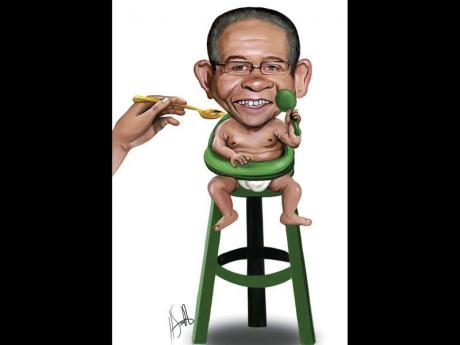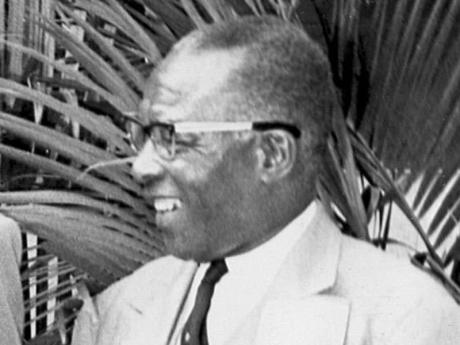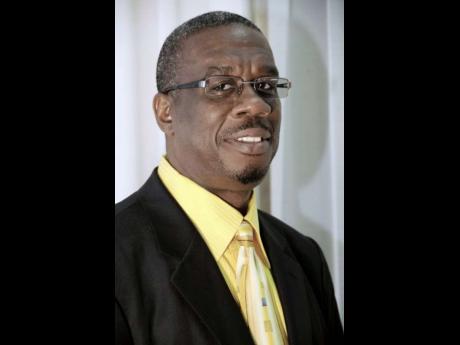Golding's gold spoon
Gary Spaulding, Guest Columnist
There is a school of thought that Prime Minister Bruce Golding has been handed his political fortunes on a platter, and there is another that his propensity to flee for cover when things go wrong has kept him afloat in the political pond.
There are numerous Jamaicans, including many in the Jamaica Labour Party (JLP), who are of the view that Golding cringes at a challenge, and baulks at being challenged, yet he has been saved all too often by some form of proverbial gold to which he is not entitled.
As a second-generation politician, the constituency of Western St Catherine was 'owned' by the JLP and nurtured by Bruce's biological father, Tacius Golding.
Thirteen years after his father influenced his entry into representational politics, Central St Catherine was handed to Golding by his then political father, Edward Seaga, in 1983, and Western Kingston, the strongest of all JLP strongholds, which was occupied by Seaga, was 'forcefully' bequeathed to him in 2006.
Despite thunderous protestations from within the JLP, Golding, Seaga's erstwhile heir apparent, ascended to the helm of the JLP, a year earlier in 2005, without a whimper - no contest there.
And it is also arguable that the loftiest position of them all - that of prime minister - was handed to Golding on a golden platter in 2007 by Portia Simpson Miller, who misread the signs of the times.
Never challenged
As for Golding's other political accomplishments, it has been suggested that he has never really been challenged for any position that he held in the party.
And he has never challenged anyone for a position within the JLP, for that matter.
Golding was general secretary of the JLP in the 1970s, and chairman of the party in the 1990s.
He was never challenged for these posts under Seaga's wary gaze.
A compromise was brokered when Audley Shaw took an interest in the chairmanship post in the 1970s, and Golding was swept into the coveted position without a semblance of a challenge.
Golding was a young man of 24 when, running on the momentum of his father, the first speaker of the House of Representatives of independent Jamaica, he won the Western St Catherine seat.
With the momentum waning over the next four years, the JLP lost the seat for the first time since 1944, as Golding was defeated by the People's National Party's Ruddy Lawson in 1976.
Despite the JLP's overwhelming popularity, Golding did not run on the party ticket in the 1980 general election.
Housing portfolio
But Golding was not to be left out, despite his reluctance to challenge for a seat.
Seaga, the new prime minister, appointed him to the Senate and gave him the housing portfolio.
When the Michael Manley-led PNP boycotted the 1983 general election, Golding would not be challenged in the new Central St Catherine, created, allegedly, for him, through adroit gerrymandering.
He lost the JLP-dominated seat to Olivia 'Babsy' Grange, another of Seaga's protégés in 1997, two years after defecting from the JLP to form the National Democratic Movement (NDM).
The JLP is yet to lose the Central St Catherine seat that was created for Golding.
It is argued still that Golding was responsible for the PNP creating political history by winning three consecutive general elections.
For while the NDM, under Golding's leadership, failed to secure a single seat in 1997, it became a spoiler of sorts for the Seaga-led JLP.
Golding's head-on collision with Seaga in the mid-1990s was propelled by the push by a group of western dissidents to oust the then JLP leader of more than 21 years.
Seaga felt betrayed by the actions of his one-time protégé, and the wounds in the JLP widened as battle lines were formed.
At a time when political antipathy was rife, Golding's 'new and different' political rhetoric resonated with Jamaicans.
Buoyed by the magnetic effect of his speeches, Golding left the party of his father and drew unto himself many 'disciples', including the Reverend Herro Blair; Professor Stephen Vasciannie; David Wong Ken; as well a large group of former Labourites such as Christopher Tufton, Douglas Vaz and his son, Daryl.
Golding's analysis that he was starting from ground zero while the two major political parties, with more than 100 years between them, enjoyed considerable ground support seemed to be on target.
However, despite his vaunted analytical prowess, Golding misread the signals demonstrated by Jamaicans' willingness to listen.
He, strangely, surmised that Jamaicans would have been sufficiently swayed by rhetoric and put their Xs somewhere aside from the traditional bell and head.
Four years later, in 2001, Golding abandoned the party he had formed and took to the airwaves.
Citing his inability to re-energise the NDM, Golding formally announced on Sunday, March 18, 2001 that he was quitting as president of the NDM.
His resignation, he said, came in the face of the NDM's poor showing in the St Ann North East by-election in which its candidate, Vice-president Barbara Clarke, got just 740 of the more than 15,000 votes cast.
Clarke had fared better against Karl Samuda four years earlier in North Central St Andrew, copping 1,411 of the 15,000 votes.
After he announced his resignation, pandemonium erupted as scores of his supporters, some crying, some swearing, got up, forcing a lunch break.
Golding's frequent resignations have had a way of stirring up myriad emotions.
When he left, furious diehards attributed Golding's decision to some NDM executives, who were described as "back-stabbers and panya machetes".
One female remarked in the midst of the melee: "Is Bruce and Central St Catherine form de NDM an' unnu know seh him have de Labourite stench pon him, an' unnu join de bandwagon."
Ushered in
Thereafter, Golding spent his time using his oratory skills to host a radio talk show, before he was ushered into the political spotlight by some arrangement which was forged between private-sector leaders who wanted to see the back of the PNP administration and the leadership of the JLP.
Bruce Golding had returned to the JLP without a challenge.
He had, once again, made his way into the political domain.
Golding was given Western Kingston after Seaga was forced out as a party leader, when Tom Tavares-Finson, a familiar figure in the constituency, was sidelined because he had no seat to exchange with Golding when he took over the reins of the JLP in 2005.
The influential 'don' at the time, Christopher 'Dudus' Coke, had, according to word on the ground, vetoed the selection of Olivia 'Babsy' Grange, after it was proposed that she would have exchanged the Central St Catherine seat with Golding.
Under Golding's watch as member of parliament, Western Kingston, in particular, has changed dramatically.
Many of the symbols of the community are gone, including Dudus, the influential gangs of Tivoli Gardens and its environs and at least 73 civilians who died during the police-military operation more than a year ago.
Golding was not challenged when he emerged as leader of the JLP in 2005-6, after a group of young Labourites calling themselves reformists made their move against Seaga by outjostling Edmund Bartlett and Olivia Grange, two deputy leaders known to be close to Seaga.
Initially, there were seven names which surfaced to challenge Golding, but this number was quickly reduced to zero.
Golding remains prime minister, leader of the JLP, and MP for Western Kingston.
Opinion polls have indicated that Golding's popularity has plummeted because of the extradition dispute. They have also shown that Andrew Holness and Tufton are considered the leading potential replacements for Golding.
With a general election imminent, can Bruce Golding defy the odds by standing up to a real challenge inside his party and silence detractors once and for all?
Gary Spaulding is a political affairs journalist. Email feedback to columns@gleanerjm.com and gary.spaulding@gleanerjm.com.



